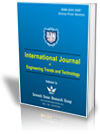Review on the Comparative Study of Optimization Methods for Thermal Devices
Citation
Bopanna K D, Abhishek Mamidi, Akarsh R, Neil George, Yashas Bharadhwaj"Review on the Comparative Study of Optimization Methods for Thermal Devices", International Journal of Engineering Trends and Technology (IJETT), V59(2),117-121 May 2018. ISSN:2231-5381. www.ijettjournal.org. published by seventh sense research group
Abstract
Various optimization methods were thoroughly studied, compared and reviewed for optimization of thermal devices. In this study, most commonly used optimization methods such as Full Factorial method, Partial Factorial method (Taguchi Method), Sequential Global Optimization method and Bottleneck methods are individually studied. Further, individual methods are reviewed on comparative parameters such as the number of trials, statistical reliability, complexity and the time taken to complete the given case study. On performing a comprehensive review of the above-said methods, it was concluded that Partial Factorial Method (Taguchi method) holds the precedence amongst the others..
Reference
[1] Hong-Sen Kou, Ji-Jen Lee & Chi-Yuan Lai (2003) Thermal Analysis and Optimum Fin Length of a Heat Sink, Heat Transfer Engineering, 24:2, 18-29, DOI: 10.1080/01457630304083
[2] Srinivas Athreya, Dr. Y.D.Venkatesh, Application Of Taguchi Method For Optimization Of Process Parameters In Improving The Surface Roughness Of Lathe Facing Operation, International Refereed Journal of Engineering and Science (IRJES), Volume 1, Issue 3 (November 2012), PP.13-19
[3] Robin Bornoff, Byron Blackmore & John Parry, Heat Sink Design Optimization Using the Thermal Bottleneck Concept, 27th IEEE SEMI-THERM Symposium, 978-1-61284-736-8/11/$26.00 ©2011 IEEE.
[4] John Parry, Simulation-Based Design Optimization Methodologies Applied to CFD, IEEE transactions on components and packaging technologies, vol. 27, no. 2, June 2004
Keywords
Optimization techniques, Full Factorial method, Partial factorial method, Taguchi method, Bottleneck method, Sequential Global Optimization method.



